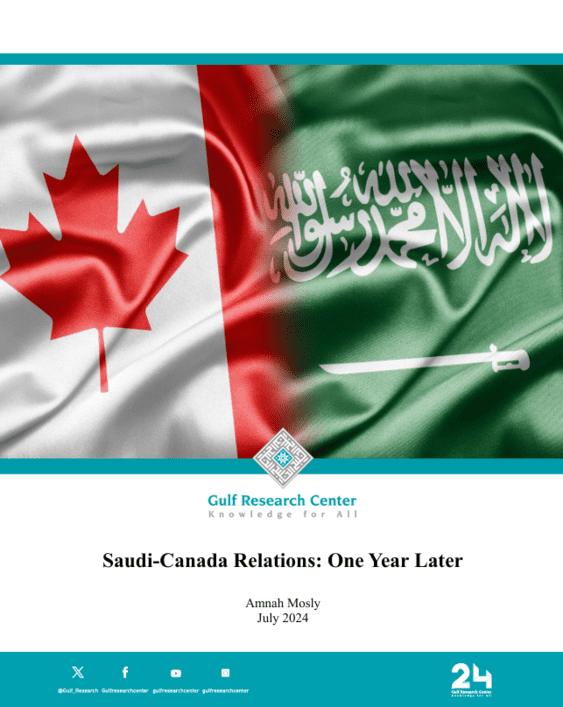Select any text and click on the icon to listen! ByGSpeech
ByGSpeech
 ByGSpeech
ByGSpeech ByGSpeech
ByGSpeech
More than a year has passed since the announcement of the restoration of ties between Saudi Arabia and Canada in May 2023. This restoration, based on “mutual respect and common interests,’ as stated by the Ministry of Foreign Affairs of the Kingdom of Saudi Arabia, marked an important turning moment in the relationship between the two nations. The decision to resume diplomatic relations resulted from the discussion between Saudi Arabia’s Crown Prince and Prime Minister, HRH Prince Mohammed bin Salman, and Canada’s Prime Minister, H.E. Justin Trudeau, at the Asia-Pacific Economic Cooperation (APEC) Forum in Bangkok in November 2022. The subsequent appointments of H.E. Jean-Philippe Linteau as Canada’s new ambassador to the Kingdom and H.E. Amal Y. Almoallimi as Saudi Arabia’s new ambassador to Canada represented the initial steps to focus once again on cooperation between the two nations.
Since then, numerous positive developments can be highlighted. First, Saudi Arabia and Canada in January 2024 have agreed to re-exchange trade delegations following a five-year suspension. The Federation of Saudi Chambers of Commerce and its Canadian counterpart signed a memorandum of understanding to form a joint Saudi-Canadian Business Council. H.E. Hassan Al Huwaizi, President of the Saudi Chambers of Commerce, called it a “positive step” that “will help elevate trade and business ties between the two countries.” Trade has always been an essential factor in the Saudi-Canadian relations. According to the Government of Canada: in 2022, Saudi Arabia was Canada’s most important two-way trading partner in the Middle East and North Africa (MENA) region, and 23rd globally, and merchandise trade between Canada and Saudi Arabia in 2022 was approximately $5.1 billion, with $1.3 billion in exports from Canada and $3.8 billion in imports to Canada.
The establishment of the Saudi-Canada Business Council will serve as a mechanism to further enhance economic and trade ties between the two sides. Moreover, in line with Saudi Arabia’s Vision 2030, closer Saudi-Canada business relations, especially in industrial sectors such as manufacturing, logistics, tourism, renewable energy, and entertainment, presents opportunities for specific collaboration. For instance, Saudi Arabia’s giga-projects and investments in ICT, renewable energy, healthcare, education, infrastructure, entertainment, and tourism are generating significant demand in various sectors where Canada excels, offering a promising and optimistic future for Canadian businesses and companies. The Canadian Ambassador echoed this, explaining that “what is happening in Saudi Arabia is unique in the world. No other country is changing as quickly as Saudi Arabia under Vision 2030. And so, really, that’s where I see the opportunity for collaboration.”
Second, Canada’s ambassador to Saudi Arabia, H.E. Jean-Philippe Linteau, announced in February 2024 that Canada is looking to strengthen a comprehensive partnership with Saudi Arabia to promote regional peace and security and economic cooperation. Since the two countries established relations in 1973, Saudi Arabia and Canada have cooperated on various common interests about peace and security issues, such as energy security, humanitarian aid, and counterterrorism. The two countries have also worked closely on international issues in the G20, the International Civil Aviation Organization (ICAO), the UN, UNESCO, and the WTO. Canada is now focusing on engaging with the Kingdom more proactively to play a more significant role also in promoting regional security, a move that falls in line with the de-escalation strategy pursued by the Kingdom in recent years. The Canadian Ambassador elaborated on this, stating that “we will continue to work together towards a safer and more prosperous world” and that “if you name any crisis that’s going on in the world: Ukraine, Sudan, Yemen, Palestine — Canada and Saudi Arabia have been collaborating. Our foreign ministers have been talking and we see eye to eye on what needs to happen for us to find solutions, find a way forward in those crises.” This is evident following the visit of Honourable Mélanie Joly, Minister of Foreign Affairs, to the Kingdom in March 2024, where she met with her Saudi counterpart, HRH Prince Faisal bin Farhan, and discussed regional security challenges, including Gaza, Ukraine, and Sudan.
Third, in May 2024, Saudi Arabia hosted the first Saudi-Canadian Forum for Educational Partnership in Riyadh with the presence of Saudi Minister of Education H.E. Yousef Al-Benyan. The event underscored the historical ties in education between the two nations. Following the Minister’s visit to Canada on February 18, H.E. Minister Al-Benyan highlighted numerous opportunities for collaboration in general and higher education, early childhood programs, and teacher development, as well as medical, technical, and vocational training programs. He further emphasized the importance of increasing cooperation between the two countries in research and development in priority areas consistent with Vision 2030. Educational ties have always been a pillar in Saudi-Canada Relations. For years, Canada has been one of the preferred destinations for international students from Saudi Arabia. Consequently, the Kingdom established the Saudi Arabian Cultural Bureau (SACB) in May 1978. While the number of Saudi students in Canada drastically decreased between 2015 and 2022, falling by 94% to fewer than 750 students in 2022, the two countries are now aiming to bring back the positive relationship between Saudi Arabian international students and Canadian institutions.
Moving forward, there exists renewed potential for cooperation across the political, security, economic, and educational fields. The restoration of ties between Saudi Arabia and Canada has brought about a number of positive developments over the past years, emphasizing trade and economic cooperation, regional security, and educational partnerships. The two nations’ ongoing collaboration and mutual respect, therefore, reflect a forward-looking path for enhancing bilateral relations.
*Amnah Mosly is a Researcher at the Gulf Research Center